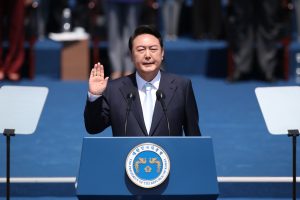U.S. President Joe Biden will first meet new South Korean President Yoon Suk-yeol in Seoul on May 21. It will be an important meeting for both leaders – not only to strengthen the South Korea-U.S. alliance but also to collaborate on a range of pressing issues, from North Korea to the Russia-Ukraine War to the protection of liberal democracy. The summit, to be held just 11 days after Yoon was inaugurated as president, will be his debut as a political leader on the international stage. Unlike political veteran Biden, Yoon formally entered politics only last summer and has yet to develop a policy track record. What should we expect from the new South Korean president at this first summit?
During the hotly contested campaign, Yoon’s opponents criticized him as South Korea’s Donald Trump. Western media and pundits also tended to portray him in a similar vein as an “anti-feminist political novice” with a “Trump style brand of very divisive identity politics.” To be sure, he is not a conventional democratic leader who values negotiation and compromise; he envisions a strong South Korea that can stand up to China and North Korea, echoing Trump’s “America First.” Yet such a characterization risks setting off a false alarm that can badly mislead the United States and other allies in how they approach his administration.
First and foremost, Yoon is not a “political outsider” in the same sense as Trump. While Yoon, unlike every South Korean president since democratization, has no legislative experience in the National Assembly, he served as prosecutor-general during the Moon Jae-in administration, a leadership position often requiring sound political judgment as well as legal expertise. Yoon built his reputation as a fierce fighter against abuse of power and corruption, shifting public opinion in his favor. This degree of legal, policy, and political experience is a far cry from starring on “The Apprentice.”
Crucially, Yoon curried strong support among conservatives, successfully mobilizing diverse factions to create an anti-Moon coalition and win the election, similar to Biden’s victory in the 2020 election. Whereas the Trump administration was filled with individuals offering only limited policy experience, and many critical appointed positions were left vacant, Yoon is supported by the seasoned conservative establishment joining his administration. In this respect, Yoon recalls George W. Bush, whose first formal foray into Washington politics came after serving as governor of Texas and who relied on the close network of the Republican establishment, such as Dick Cheney and Donald Rumsfeld, for policy and political guidance.
Yoon’s key cabinet and presidential office nominees are well-known figures with extensive policy backgrounds. New Unification Minister Kwon Young-se is a four-time member of the National Assembly and served as Seoul’s envoy to Beijing during the Park Geun-hye administration. Yoon’s national security advisor, Kim Sung-han, is a professor at Korea University who served as the vice minister of foreign affairs and trade during the Lee Myung-bak administration. Yoon is also supported by a powerful group of South Korean elites who attended Seoul National’s law school, his alma mater. Such heavy reliance on experienced hands of the conservative establishment reduces uncertainty for the Biden administration.
Yoon is expected to adopt a largely conventional conservative stance on major policy issues, both domestic and foreign. His economic policy is likely to be market-led and minimize state intervention, replacing Moon’s policies such as “income-driven growth” that Korean conservatives branded as socialist. On foreign policy, Yoon seeks to strengthen the U.S. alliance and restore relations with Japan, which, under Moon, were the most precarious they have been since the normalization of relations in 1965.
It is noteworthy that, as president-elect, Yoon sent his special delegation to the United States and Japan followed by the European Union, but not to China and Russia, departing from past precedent. Yoon is expected to take a firm stance against Beijing and Pyongyang rather than embrace appeasement.
At the upcoming summit, Yoon will have the opportunity to assure global audiences that he is not South Korea’s Trump but a reliable partner of the United States and other allies with shared democratic values. In his inaugural speech, he repeatedly stressed the importance of “freedom” to clearly signal his resolve to protect liberal democracy both at home and abroad. This is great news for Biden, who badly needs support from allies like South Korea in his fight against global autocracy.
Just as Yoon will be tested, the summit presents a chance for Biden to demonstrate he is prepared to work closely together with the new South Korean president, overcoming the concerns unearthed during his campaign, in order to bolster the alliance and democracy.

































